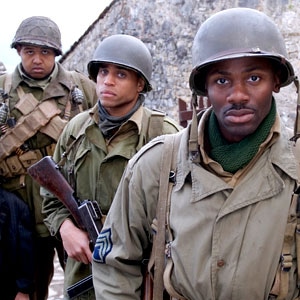 Buffalo Soldier/On My Own Productions
Buffalo Soldier/On My Own ProductionsReview in a Hurry: During World War II, four young men from the all-black 92nd Buffalo Soldier division face off against Nazis and a racially charged U.S. military, and end up making their last stand in Italy with a young boy. It's uneven but often powerful, two things we've come to expect from director Spike Lee.
The Bigger Picture: Lee has always been more interested in creating a dialogue with the audience than merely presenting a straight-up story, so the mixed results of this WWII drama shouldn't come as a surprise.
What is surprising, and not very effective, is how uneven James McBride's script is. Sections can be quite powerful, but others are so cheesy you'll feel like you've walked into Cinema Paradiso II. And at two and a half hours, the flick feels more like an early draft with the strong moments weighed down by filler.
But all is not lost. When Lee keeps the focus on how the U.S. treated their black soldiers in contrast to their Nazi POWs, he's on fire. No other filmmaker comes close to examining issues of race like Lee, with characters both funny and flawed. Most effective is when Lee shows us how Stamp (Derek Luke) can't stand that fellow black soldier Bishop (Michael Ealy) can set back race relations just by opening his mouth. Another great sequence has the Buffalo Division being taunted by a soothing German radio host who insists it is the U.S. that despises the black soldier and not Germany. Powerful stuff.
If only Lee had kept his focus, Miracle at St. Anna could have been an Oscar contender, but issues abound like needlessly book-ending the film with scenes from the '80s that feel like a bad cop drama. And let's not forget about the Cinema Paradiso-type stuff with the kid. On second thought, yes, forget them.
The 180—a Second Opinion: After all the shouting and name-calling, it turns out Spike Lee's WWII drama is as much a mixed bag as Clint Eastwood's WWII flicks. Lee cast his better, though—we'll take cover with Derek Luke over Ryan Phillippe any day.